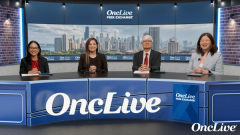
Opinion|Videos|July 16, 2024
Redefining SCLC: Molecular Subtypes and Blood Biomarkers Guide Therapy
Key opinion leaders investigate the potential impact of redefining small cell lung cancer (SCLC) as a molecularly heterogeneous malignancy on personalized treatment strategies for SCLC subtypes with distinct therapeutic vulnerabilities, while exploring the emerging role of blood-based biomarkers in shaping the evolving treatment landscape for SCLC.
Advertisement
Episodes in this series

- How redefining SCLC as a molecularly heterogeneous malignancy might better inform personalized treatment of its subtypes with unique therapeutic vulnerabilities.
- How the mechanism of promoter methylation levels in ctDNA subtypes contribute to “subtype switching” in relapsed SCLC.
- Potential contribution of subtype switching to treatment resistance (platinum-based chemotherapy)
- How ‘switching’ to an inflammatory phenotype might improve therapeutic response to immune checkpoint inhibitors vs other SCLC subtypes
- The variable response of SCLC subtypes to currently available therapies
- Briefly discuss significant adverse events in patients with LS-SCLC who receiveIO-based regimens and explore strategies for their mitigation and management.
Advertisement
Latest CME
Advertisement
Advertisement
Trending on OncLive
1
Long-Term Cilta-Cel Data Show Low Rates of PFS Events in Standard-Risk R/R Myeloma
2
Real-World Data Support Clinical Benefit With Lifileucel in Previously Treated Advanced Melanoma
3
FDA Updates Axi-Cel Label to Remove Limitation of Use in R/R PCNSL
4
Dr Riedell on the Long-Term Efficacy of Tisa-Cel in R/R Follicular Lymphoma
5



































